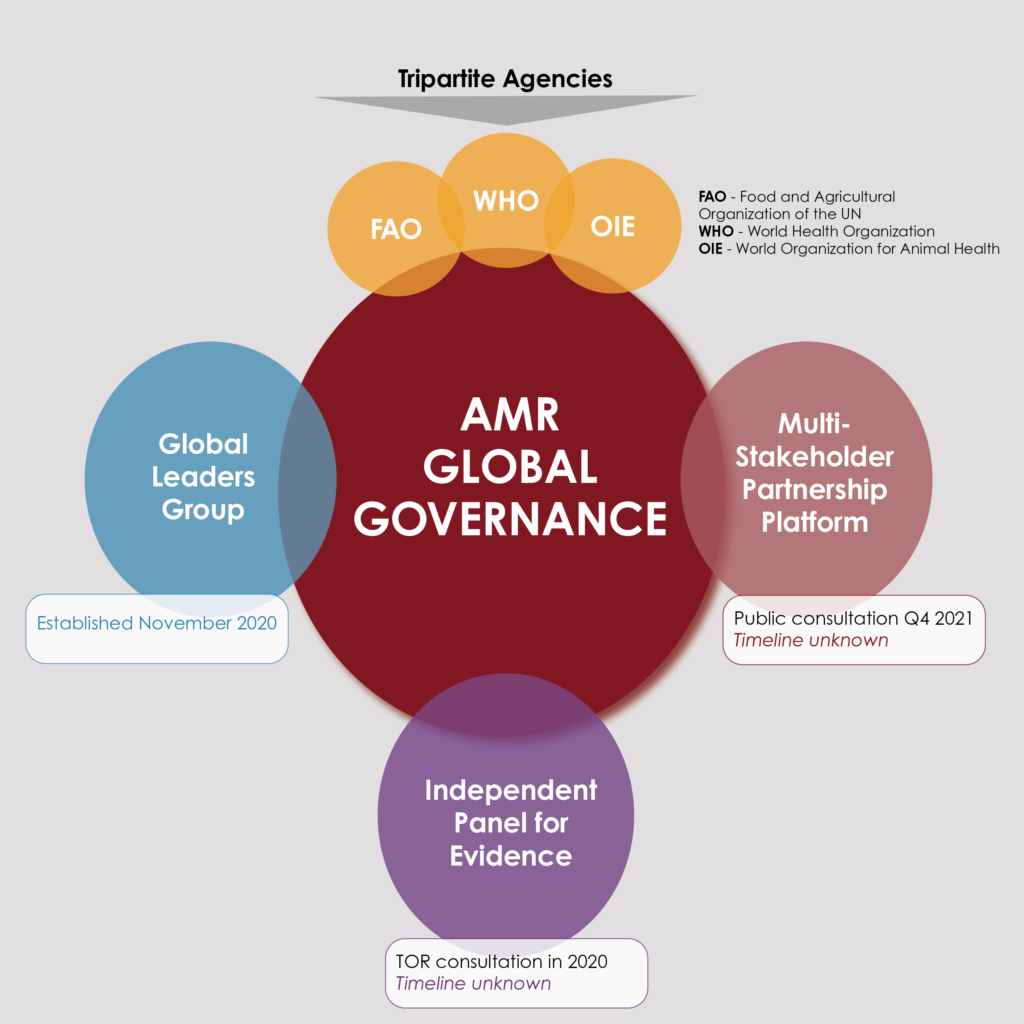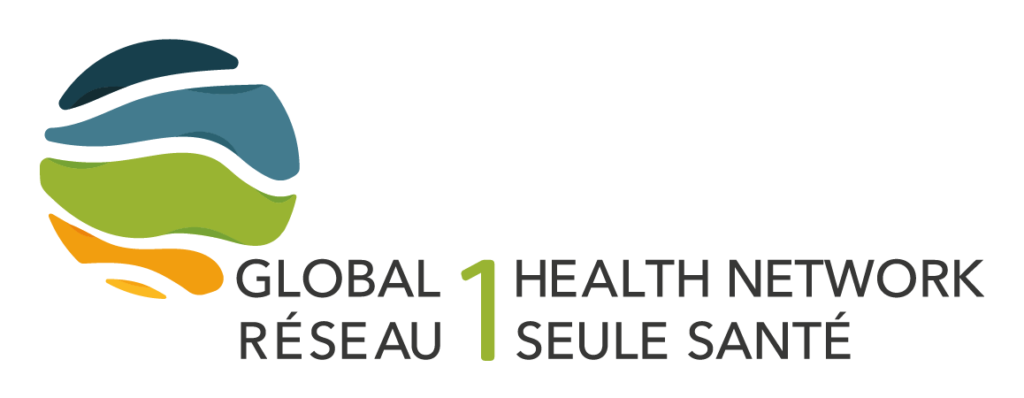Project
Last Updated on July 23, 2024

Background
The rise of antimicrobial resistance (AMR) as a silent pandemic, driven by antimicrobial (AM) overuse and misuse in agriculture and human and animal health, heightens the need for improved global and national governance to strengthen AM stewardship. Although recognition of One Health (OH) principles in governing the prevention of AMR has grown, their practical implementation has proven challenging.
AMR is emblematic of problems of the global commons; its resolution depends on the coordination of collective global strategy to support a OH approach through transnational governance fora. Addressing the challenges posed by AMR relies on intersectoral policy coordination—across public health, agricultural, environmental, and pharmaceutical sectors—as well as on international policy coordination, making stewardship complex, with new models and approaches to govern AM stewardship imperative.
Our research will analyze supranational and state governance approaches that support the development of mutually beneficial policies and manage challenges posed by reciprocal state interdependence.

Project
To address the challenges that a One Health approach poses for AMR governance, we will conduct situational, institutional, legal, and impact analyses of antibiotic stewardship governance approaches and policies in six countries/four continents (Netherlands, Senegal, Philippines, Canada, Hungary, U.S.) across human, animal, and environmental settings.
Second, a comparative analysis will identify innovative international policy, legal, design, and regulatory elements of OH governance approaches across high-, medium-, and low-income country case study states.
Third, we will apply systems analysis to understand the complex relationships and contingencies inherent in the governance of antibiotic stewardship in state and transnational contexts.
Finally, design-thinking will be employed in national workshops in the Netherlands, Senegal, Philippines, Canada, Hungary, and the U.S., informed by evidence emerging from the situational, comparative, and systems analyses and engaging both decision-makers and local stakeholders. Design workshops will clarify the innovations and incentives that foster a OH approach to antibiotic stewardship and inform governance mechanisms and policy solutions that address AMR.
Project Team
Project Lead
Prof. Mary Wiktorowicz is a professor, associate director of the Dahdaleh Institute for Global Health Research, and member of the Global One Health Network (Global 1HN) and WHO Collaborating Centre on the Global Governance of AMR. Her research on the design of comparative frameworks to evaluate models of global health governance has appeared in Social Science & Medicine, Globalization and Health, and Evidence and Policy. She will coordinate the research and lead the analysis of transnational governance models and comparison of national models to support antibiotic stewardship. She has experience leading research collaborations and strong connections with AMR researchers and knowledge users.
Canadian Project Team
Dr. Tarra Penney is an expert in systems analysis and policy evaluation in collaboration with WHO Europe. She will lead and supervise postdoctoral fellow Dr. Chloe Clifford Astbury in the systems analysis. Dr. Adrian Viens focuses on global health law, analyzing how legal epidemiology and regulatory theory shape global health policy; he will lead the legal analysis. Dr. Shital Desai will lead the design thinking toolkit that addresses state cultural practices and global standards to develop policy strategies. Dr. Michelle Wyndham-West will co-lead the design-thinking workshops. Dr. Suzanne Hindmarch, a political scientist, focuses on the global politics of infectious disease response; she will assist with the institutional and comparative analyses. Dr. Alex Wong focuses on the genomic and environmental aspects of AMR. Dr. James Orbinksi is a global health leader, researcher, and director of the Dahdaleh Institute for Global Health Research. Dr. Susan Rogers Van Katwyck is managing director of the WHO Collaborating Centre on the Global Governance of AMR. Dr. Cecile Aenishaenslin, an interdisciplinary veterinary science and epidemiology researcher, will lead the impact analysis. Dr. Arne Ruckert is research coordinator of Global 1HN and will ensure our consortium liaises with other research networks active in AMR. Dr. Andrew Morris was commissioned by the Public Health Agency of Canada to develop a Pan-Canadian AMR network and governance structure. Dr. Kumanan Wilson is a consultant to the WHO on the International Health Regulations. Dr. Derek MacFadden, a clinician scientist, focuses on antibiotic use and stewardship and will leverage his international stewardship implementation experience. Dr. Srikanth Kondreddy, a member of the Institute for Pandemics and Global 1HN, focuses on international health regulations compliance and global health security.
International Project Team
Netherlands Team: Dr. John Paget is a senior scientist (epidemiologist and social scientist) who will coordinate the team at Nivel and support the team in Hungary. For the work at Nivel, the Dutch case study and the comparative systems analysis will be carried out in collaboration with Dr. Michel Dückers (programme leader of Disasters and Environmental Hazards at Nivel and professor at University of Groningen), an expert in evaluation research and cross-national analyses.
French Team: Dr. Marion Bordier is a researcher in veterinary public health with strong expertise in the design and evaluation of integrated health initiatives. She will lead the scoping reviews to identify effective AM surveillance and stewardship interventions informed by the One Health approach. She will also coordinate activities conducted by the Cirad team in support of the Senegalese case studies.
Senegalese Team: Dr. Alpha Amadou Diallo, National Laboratory for Livestock and Veterinary Research (LNERV), optimizes diagnostic tools and develops and evaluates surveillance plans for cross-border diseases and zoonosis. He will lead the Senegalese network and organize meetings with the AMR working technical group at the National High Council for Global Health Security.
Philippine Team: Dr. Marilen Parungao Balolong is a public health professional specializing in medical microbiology, with many high-impact publications. Dr. Balolong was awarded the Outstanding Scientific Paper Award for her work on AMR by the National Academy of Science and Technology and the 2018 Outstanding ASEAN Science Diplomat by the ASEAN Foundation, Environmental Climate Change Research Institute, and the Harvard Kennedy School in recognition of her contributions in the fields of microbiological and environmental research in development of a climate change-resilient ASEAN region. She heads the Applied Microbiology for Health and Environment Research Group advocating for OH, which addresses issues concerning health and environment. In her AMR research she works closely with international institutions including CARE (Netherlands) and York University, Canada.
Hungarian Team: Dr. Ria Benko, clinical pharmacist at the University of Szeged, has expertise conducting drug utilization studies related to antibiotics. She has been continuously involved in EU projects related to AMR and will lead the institutional, situational, and impact analyses in Hungary. The research team will consist of Drs. Dezső Csupor and Mária Matuz and one PhD student, Roxána Rúzsa. Dezső Csupor is the new head of the Clinical Pharmacy Department and serves as the president of the Medicinal Plant Section of the Hungarian Society of Pharmaceutical Sciences. Mária Matuz has expertise in drug utilization research.
For more information, please contact us at jpiamr@yorku.ca
Joint Program Initiative on Antimicrobial Resistance (JPIAMR) 2021-177 DESIGN, Grant #3468277 Nominated PI/Coordinator: M. Wiktorowicz, Country leads: J. Paget, M. Bordier, A. Diallo, M. Balolong, R. Benko, Co-PIs: M. Duckers, C. Aenishaenslin, C. Clifford Astbury, S. Desai, S. Hindmarch, S. Kondreddy, D. MacFadden, A Morris, J. Orbinski, T. Penney, S. Rogers Van Katwyk, A. Ruckert, A.M. Viens, K. Wilson, A. Wong, C. M. Wyndham-West, D. Wernli


Themes | Global Health Foresighting |
Status | Active |
Related Work |
N/A
|
Updates | |
People |
Mary E. Wiktorowicz, Associate Director - Active
Tarra Penney, Faculty Fellow, Faculty of Health - Active Shital Desai, Faculty Fellow, School of the Arts, Media, Performance & Design - Active Chloe Clifford Astbury, Research Fellow, Global Food System & Policy - Alum |
You may also be interested in...
Recap – Voices on the Move Podcast Launch
The Dahdaleh Institute recently hosted the launch event for Voices on the Move, a podcast focusing on the complex relationship between climate change and migration. Hosted by Dahdaleh faculty fellow Yvonne Su and Sabrina Sam, ...Read more about this Post
Congratulations! Jude Kong Selected to Develop Global South Artificial Intelligence for Pandemic and Epidemic Preparedness and Response Network
The five-year project is aimed at ensuring vulnerable and at-risk populations are included in disease outbreak management and policies. At a time when the risk of emerging or re-emerging infectious diseases (ERIDs) is increasing, an ...Read more about this Post
Call for Presentations – 2023 Critical Social Science Perspectives in Global Health Workshop
The fourth Critical Social Science Perspectives in Global Health (CPGH) Research workshop returns as an in-person event on Wednesday, March 29 from 9 a.m. to noon ET at the Dahdaleh Institute for Global Health Research. Continental ...Read more about this Post
